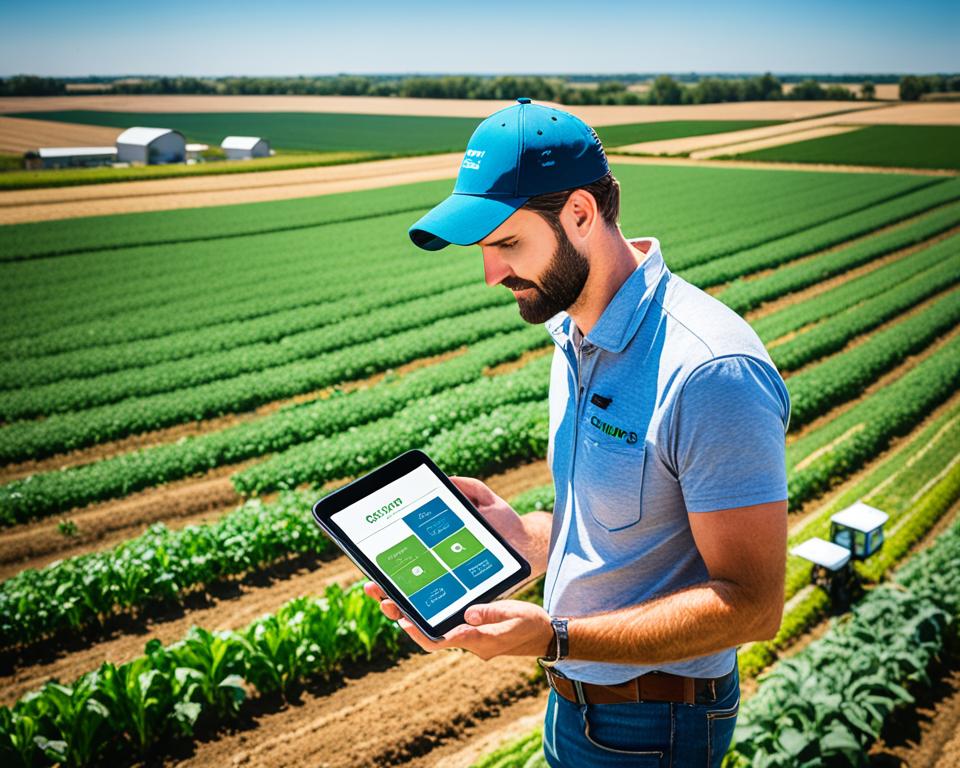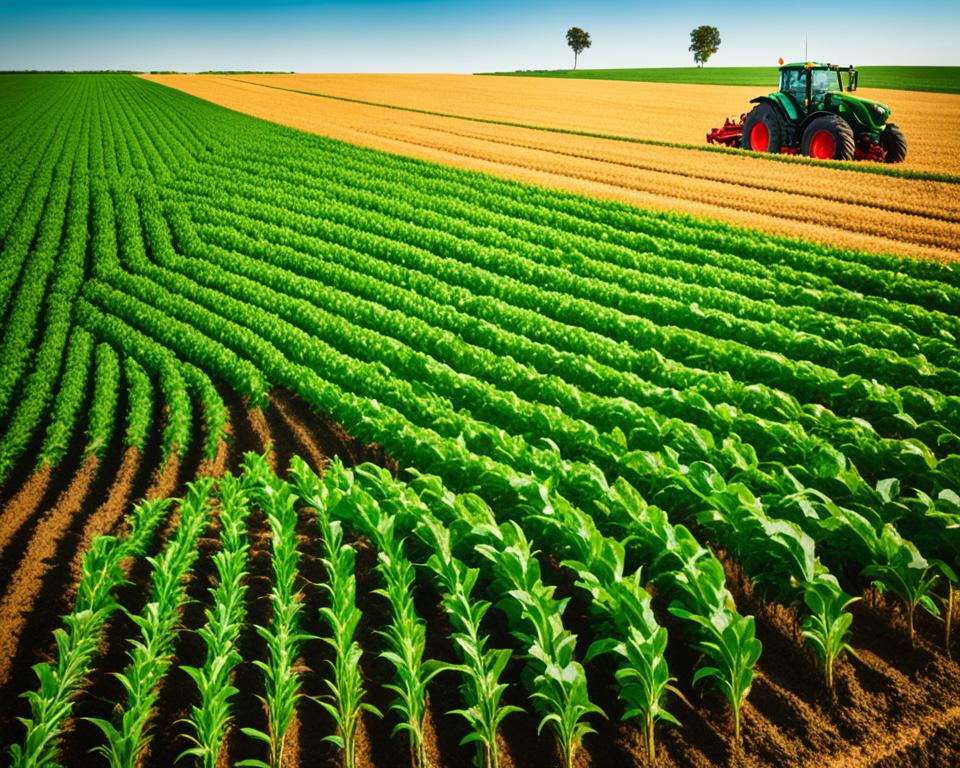Adverts
The application of the Internet of Things (IoT) in agriculture is transforming the sector in Brazil, bringing numerous facilities and benefits. With the advancement of technology and the adoption of digital tools and techniques, agriculture is undergoing a revolution called Agriculture 4.0. This means producing more, better and sustainably, using sensors and connected devices to automate processes, collect intelligent data, reduce waste, increase the efficiency of natural resources and obtain a competitive advantage in the agricultural market.
Adverts
Main points of the article:
- The application of IoT in agriculture is revolutionizing the agricultural sector in Brazil.
- Agriculture 4.0: produce more, better and sustainably.
- Process automation, intelligent data collection and waste reduction.
- Advantages of IoT in agriculture: monitoring, automation and competitive advantage.
- IoT applications in agriculture: production monitoring, intelligent irrigation and soil control.
What is IoT in agriculture?
IoT in agriculture refers to the application of the Internet of Things (IoT) in the agricultural sector. By connecting devices such as sensors, agricultural machinery and equipment, it is possible to collect, share and analyze information about the agricultural environment. This allows farmers to make more informed decisions and carry out strategic actions to optimize cultivation, such as monitoring soil quality, automating irrigation, controlling pests, monitoring animal health, among others.
A IoT in agriculture makes it possible to connected agriculture, where machines and systems are integrated to provide a smarter and more efficient environment. Connected devices collect real-time data, enabling valuable insights that can be applied to improve productivity, reduce costs and increase sustainability in agriculture.
Adverts
With IoT in agriculture, farmers can monitor the agricultural environment remotely and automatically. Soil sensors can provide information about soil moisture, nutrient levels and pH, enabling accurate application of agricultural inputs. Meteorological sensors can provide data on temperature, humidity and wind speed, helping to plan crops and predict weather events.
Process automation is another advantage of IoT in agriculture. Through the connectivity of agricultural equipment, it is possible to control irrigation, spraying and harvesting more precisely and efficiently. Furthermore, IoT in agriculture also enables the creation of traceability systems, allowing farmers to monitor the entire production cycle and guarantee the quality and safety of food.
With the application of IoT in agriculture, farmers can make the most of available resources, reduce costs, increase productivity and minimize negative impacts on the environment. A connected agriculture brings countless possibilities to the agricultural sector, promoting more efficient, sustainable and profitable production.
Advantages of IoT in agriculture
The implementation of IoT in agriculture brings numerous advantages to farmers. Intelligent data collection allows you to monitor farm status, worker performance and device efficiency, enabling more effective management. Waste reduction is achieved by identifying anomalies in the crop, preventing infestations and saving resources.
The automation of processes, such as irrigation and pest control, brings greater precision, product quality and resource savings. Monitoring animals allows you to monitor their health and reduce the time spent searching the pasture. Furthermore, IoT in agriculture provides a competitive advantage, increasing harvests and enabling preventive maintenance of equipment.
| Advantages of IoT in agriculture | Benefits |
|---|---|
| Smart data collection | Monitoring the farm, worker performance and equipment efficiency |
| Waste reduction | Identification of crop anomalies, prevention of infestations and saving resources |
| Process automation | Precision, product quality and resource savings in irrigation and pest control |
| Animal monitoring | Monitoring health and reducing search time in the pasture |
| Competitive advantage | Increased harvest and preventive maintenance of equipment |
The implementation of IoT in agriculture brings significant benefits to the sector, allowing farmers to explore the potential of smart agriculture. By using sensors and connected devices, farmers can make more informed decisions, increase natural resource efficiency, and gain a competitive advantage in the agricultural market. IoT in agriculture is revolutionizing the sector in Brazil, boosting productivity, the sustainable use of resources and the quality of agricultural products.
IoT applications in agriculture
IoT has a series of applications in the field of agriculture, providing innovative technological solutions that boost the connected agriculture and intelligent. Through the implementation of connected devices, farmers can optimize resource use, increase process efficiency and maximize productivity. Let's explore some of the main IoT applications in agriculture:
1. Monitoring agricultural production
The installation of IoT sensors on agricultural machines allows real-time monitoring of production. These sensors collect valuable data about machine performance, such as fuel consumption, work speed and efficiency. Based on this information, farmers can make strategic decisions to improve productivity and reduce operating costs.
2. Intelligent irrigation management
IoT in agriculture enables efficient irrigation management, avoiding excessive use or waste of water. By collecting data on soil moisture, weather conditions and plant demand, irrigation systems can be activated only when necessary, ensuring an adequate supply of water for crops.
3. Soil monitoring and correction
IoT sensors allow constant monitoring of soil characteristics, such as pH and nutrient levels. Based on this data, it is possible to identify areas that require correction and apply fertilizers and correctives precisely and efficiently, optimizing plant growth and ensuring soil health.
4. Use of drones in agriculture
The use of drones equipped with high-resolution sensors and cameras makes it possible to accurately map and diagnose agricultural areas. Drones offer valuable information about the status of crops, identifying diseases, pests, water stress and other problems quickly and efficiently. This data allows for more punctual and assertive intervention, reducing losses and maximizing results.
5. Smart greenhouses
Smart greenhouses are equipped with IoT sensors that allow precise control of environmental variables, such as temperature, humidity and light. This technology makes it possible to create ideal conditions for growing plants, maximizing growth and productivity, regardless of external weather conditions.
These are just some of the IoT applications in agriculture. With constant technological evolution, new solutions are being developed to boost connected and smart agriculture, bringing even more benefits to farmers and the sector as a whole.

| Benefits | Description |
|---|---|
| Greater productivity | The application of IoT in agriculture increases process efficiency and maximizes production, allowing for a more abundant harvest. |
| Resource savings | Intelligent monitoring and efficient use of water, fertilizers and other resources contribute to reducing waste and costs. |
| More effective management | With real-time data collection and analysis, farmers can make more informed and strategic decisions for cultivation and farm management. |
| Improvement in product quality | The use of IoT allows the monitoring and maintenance of ideal conditions for plant growth, resulting in higher quality products. |
| Loss reduction | Early detection of diseases, pests and other problems allows for quick and precise intervention, minimizing crop losses. |
The importance of IoT in agriculture in Brazil
The application of the Internet of Things (IoT) in agriculture has proven to be extremely important in Brazil, boosting the agribusiness sector and contributing to the increase in food production in a sustainable way. With the country's territorial extension and the different climatic conditions in its regions, the use of IoT allows farmers to optimize their processes and make decisions based on accurate data.
Through IoT technology, it is possible to monitor several factors in real time, such as soil quality, humidity, temperature and animal health, allowing for more efficient and assertive management. In addition Agricultural IoT in Brazil is aimed at automating processes, which bring the possibility of reducing costs and waste, as well as increasing productivity.
The country also has a strong demand for innovation in the agricultural sector, driven by favorable legislation and public and private initiatives that seek to improve the efficiency and sustainability of Brazilian agribusiness. In this context, IoT stands out as one of the main technologies capable of promoting digital transformation in the field and boosting the development of technological solutions aimed at agriculture.
With the implementation of IoT in Brazilian agriculture, it is expected not only to increase productivity and optimize the resources used, but also to improve the quality of the food produced, ensuring greater safety and compliance with the quality standards required by consumers.
In summary, the importance of IoT in agriculture in Brazil lies in its ability to provide accurate and real-time information, allowing farmers to make more assertive and strategic decisions. Furthermore, the adoption of IoT in the field contributes to boosting Brazilian agribusiness, meeting the demands for sustainable and quality food production.
| Advantages of IoT in agriculture in Brazil |
|---|
| 1. Optimization of agricultural processes |
| 2. Reducing costs and waste |
| 3. Task automation |
| 4. Improving food quality |
| 5. Increased productivity |
In addition IoT in agriculture in Brazil allows farmers to more efficiently manage natural resources, promoting environmental sustainability and contributing to the preservation of natural resources for future generations.
Quote:
"A Agricultural IoT in Brazil is driving sector transformation, offering farmers tools and information to make smarter, more strategic decisions.”
The future of IoT in agriculture in Brazil
The future of IoT in agriculture in Brazil is promising. With the continuous evolution of technology and farmers' awareness of the benefits of IoT, a significant increase in the adoption of technological solutions in the field is expected. A agricultural innovation Driven by technology, it is revolutionizing agribusiness, bringing efficiency, productivity and sustainability to the sector.
One of the main expected advances is the full connectivity of agricultural devices and sensors. With the implementation of efficient communication networks, it will be possible to collect and analyze data in real time, allowing for more precise and strategic decision-making. This will significantly improve the efficiency and profitability of agricultural operations, optimizing the use of natural resources and reducing waste.
By collecting real-time data, farmers will have access to vital information about the agricultural environment, such as soil moisture, weather conditions, nutrient levels, and plant and animal health. Based on this information, it will be possible to take preventive and corrective actions quickly and accurately, avoiding losses and maximizing production. A technology in agribusiness It will be essential to face climate challenges, increase productivity and ensure food security.
Technological innovations in agriculture
With the continued development of technology, even more advanced innovations for agriculture are expected to emerge. Some examples include:
- Farm automation systems, which enable remote and automatic control of agricultural machines and processes, increasing efficiency and reducing costs.
- Artificial intelligence and machine learning solutions, which enable complex analysis of agricultural data, identification of patterns and accurate predictions.
- Animal monitoring and tracking technologies, ensuring the well-being and health of the herd.
- Mobile applications and online platforms that connect farmers with experts, facilitating the exchange of information and access to resources and services.
These technological innovations have the potential to further revolutionize the agricultural industry, making it more efficient, sustainable and profitable.
“Technology is playing a fundamental role in agribusiness, boosting the productivity and competitiveness of Brazilian farmers.”
Opportunities and challenges
The future of IoT in agriculture brings with it both opportunities and challenges for the sector. On the one hand, the adoption of technologies such as IoT allows the optimization of agricultural processes, reducing costs and increasing productivity. Furthermore, improving the management of natural resources and sustainable production are fundamental to ensuring a viable future for agribusiness.
However, the effective implementation of IoT in agriculture requires significant investments in infrastructure, technical training and information security. Additionally, connectivity in rural areas can be challenging, especially in remote regions. To make the most of the potential of IoT in agriculture, it is essential that there is collaboration between the public and private sector, as well as adequate technical support for farmers.

The future of IoT in agriculture in Brazil is promising. A agricultural innovation Driven by technology, it is transforming the agricultural sector, making it more efficient, productive and sustainable. With the continuous advancement of technology, it is expected that smart agriculture be a reality in the country, offering significant potential for food security, economic development and environmental preservation.
| Advantages of IoT in agriculture | Challenges of IoT in agriculture |
|---|---|
| 1. Increased efficiency and productivity | 1. Investments in infrastructure and training |
| 2. Reducing waste and more efficient use of natural resources | 2. Connectivity in rural areas |
| 3. More accurate and strategic decision making | 3. Information security |
| 4. Better monitoring of plant and animal health | 4. Collaboration between public and private sectors |
| 5. Possibility of advanced predictions and analysis | 5. Adequate technical support |
The importance of partnerships with technology companies in agribusiness
To obtain the maximum benefit from IoT in agriculture, it is important to have solid partnerships with technology companies specialized in the agricultural sector. These companies can provide customized solutions, offer technical support and keep up with market news. A partnership with technology companies it also encourages innovation and knowledge exchange, allowing farmers to stay up to date on the latest trends and technological solutions.
Conclusion
The use of the Internet of Things (IoT) in agriculture is revolutionizing the agro sector in Brazil. By adopting this technology, farmers can boost their productivity, reduce waste, automate processes, monitor animal health and gain a competitive advantage. The applications of IoT in agriculture are diverse and bring significant benefits to the field.
IoT enables smart data collection, allowing farmers to make more informed and strategic decisions to optimize their agricultural activities. By connecting devices and sensors, it is possible to monitor the agricultural environment in real time, ensuring more effective and sustainable management of natural resources.
In Brazil, IoT in agriculture plays a fundamental role in boosting agribusiness. With the country's varied territorial extension and climatic conditions, the adoption of this technology is essential to increase food production, meet the growing demand for sustainability and strengthen the Brazilian agricultural economy.
In summary, the IoT in agriculture in Brazil brings significant benefits to farmers, improving efficiency, productivity and sustainability in the field. The potential of this technology is enormous and we hope to see its continued evolution and widespread adoption in the Brazilian agricultural sector.
